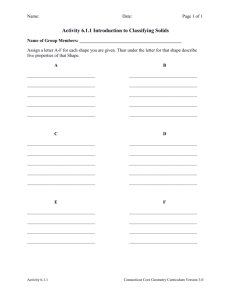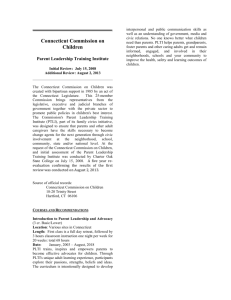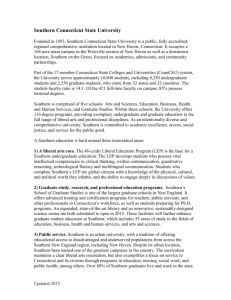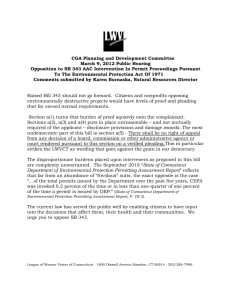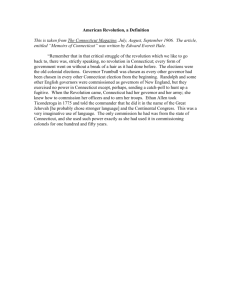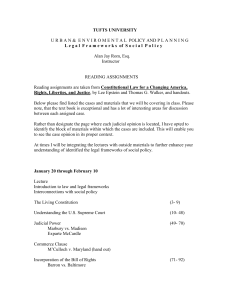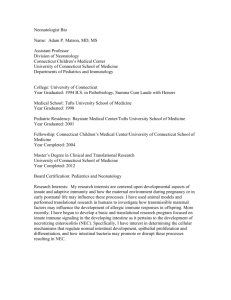the search for a dean of the school of education
advertisement
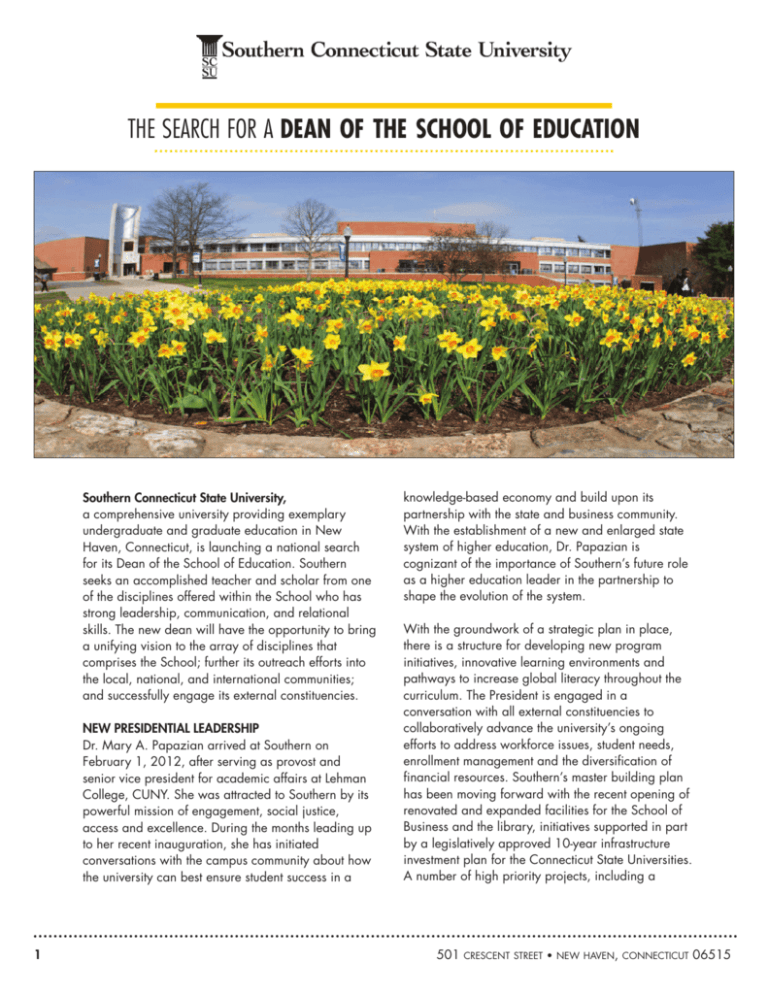
THE SEARCH FOR A DEAN OF THE SCHOOL OF EDUCATION Southern Connecticut State University, a comprehensive university providing exemplary undergraduate and graduate education in New Haven, Connecticut, is launching a national search for its Dean of the School of Education. Southern seeks an accomplished teacher and scholar from one of the disciplines offered within the School who has strong leadership, communication, and relational skills. The new dean will have the opportunity to bring a unifying vision to the array of disciplines that comprises the School; further its outreach efforts into the local, national, and international communities; and successfully engage its external constituencies. NEW PRESIDENTIAL LEADERSHIP Dr. Mary A. Papazian arrived at Southern on February 1, 2012, after serving as provost and senior vice president for academic affairs at Lehman College, CUNY. She was attracted to Southern by its powerful mission of engagement, social justice, access and excellence. During the months leading up to her recent inauguration, she has initiated conversations with the campus community about how the university can best ensure student success in a 1 knowledge-based economy and build upon its partnership with the state and business community. With the establishment of a new and enlarged state system of higher education, Dr. Papazian is cognizant of the importance of Southern’s future role as a higher education leader in the partnership to shape the evolution of the system. With the groundwork of a strategic plan in place, there is a structure for developing new program initiatives, innovative learning environments and pathways to increase global literacy throughout the curriculum. The President is engaged in a conversation with all external constituencies to collaboratively advance the university’s ongoing efforts to address workforce issues, student needs, enrollment management and the diversification of financial resources. Southern’s master building plan has been moving forward with the recent opening of renovated and expanded facilities for the School of Business and the library, initiatives supported in part by a legislatively approved 10-year infrastructure investment plan for the Connecticut State Universities. A number of high priority projects, including a 501 CRESCENT STREET • NEW HAVEN, CONNECTICUT 06515 science building, a fine arts center, a campus recreation facility, phase 2 of the School of Business facilities expansion, alumni house and a building for the health and human services program, will require a public/private partnership and the initiation of a major capital campaign. THE CONNECTICUT HIGHER EDUCATION SYSTEM On January 1, 2012, Connecticut reorganized its governance of higher education and created the Connecticut State Colleges and Universities (ConnSCU), governed by the Board of Regents for Higher Education. In creating the new structure, the state brought its comprehensive universities and community colleges under a single governing board. Conn SCU includes: the Connecticut State Universities (four institutions); Connecticut Community Colleges (twelve institutions) and Charter Oak State College, an online adult education, degree completion institution. As one of four comprehensive universities in ConnSCU, Southern maintains strong relations with its in-state peers. Its sister institutions are Central Connecticut State University in New Britain, Eastern Connecticut State University in Willimantic, and Western Connecticut State University in Danbury. As a new and enlarged system of higher education, the relationship between the system office and the universities and colleges is evolving. However, the SOUTHERNCT.EDU • 203-392-7278 • 888-500-7278 president of each university serves as the institution’s chief executive officer and is accountable to the ConnSCU for management of the university within Board policy. The president of each institution works in concert with other senior leaders on campus to develop campus policy in support of system objectives, directs the activities of administrative staff and evaluates their performance, provides stewardship over university resources, enhances instructional and development programs, facilitates research and scholarship, fosters university relations with alumni and the public, and serves as the face of the institution to external constituencies. MISSION STATEMENT Southern Connecticut State university provides exemplary graduate and undergraduate education in the liberal arts and professional disciplines. As an intentionally diverse and comprehensive university, Southern is committed to academic excellence, access, social justice, and service for the public good. SOUTHERN CONNECTICUT STATE UNIVERSITY HISTORY Southern was founded in 1893 as the New Haven State Normal School and designed to deliver strong teacher preparation, a hallmark of the university still today. In 1937, it became a four-year college – New Haven State Teachers College -- with degree-granting powers. Ten years later, it joined with Yale university's 2 department of education to offer a graduate program leading to a Master of Science degree, and assumed full responsibility for the program in 1954. In 1959, six years after the institution had moved to its present location, state legislation expanded the institution’s offerings to include liberal arts curricula leading to bachelor's degrees in the arts and sciences and subsequently renamed it Southern Connecticut State College. A board of trustees overseeing Connecticut’s four state colleges was established in 1965, and in 1983, Southern Connecticut State College became Southern Connecticut State University, part of the Connecticut State University System. Through the years, Southern has continued its growth as a modern, diversified center of higher learning, expanding both its undergraduate and graduate programs and opening up entirely new fields of study and research. ABOUT SOUTHERN CONNECTICUT STATE UNIVERSITY A partially residential university, Southern currently enrolls approximately 11,100 students. Roughly 7,300 are full-time undergraduates, 1,200 are parttime, and 2,600 are full- and part-time graduate students. Southern’s faculty is comprised of 433 fulltime and 615 part-time members, and the staff numbers approximately 700 full and part-time employees. Southern has long sought to foster in its students an appreciation for the practical application of knowledge along with a desire to pursue education beyond the scope of their fields. In doing so, Southern develops lifelong learners and effective citizens of the world. A 15:1 student-faculty ratio allows for a substantial amount of individual attention, yet Southern provides a diversity of educational opportunities generally found only at larger institutions. Its five schools --- the School of Arts and Sciences, the School of Business, the School of Education, the School of Health and Human Services, and the School of Graduate Studies --- offer more than 100 degree programs ranging from business to secondary education, biology to library science, and communication disorders to nursing. Bachelor’s and master’s degrees are awarded, as well as sixth-year professional diplomas and doctoral degrees in educational leadership and nursing. In addition to traditional in-class pedagogy, Southern offers a broad 3 array of online and hybrid courses at the undergraduate and graduate levels. • The School of Arts and Sciences enrolls 4,500 majors in 22 departments. All undergraduate students spend a minimum of one third of their collegiate careers in carefully chosen arts and sciences courses that serve as the core for their academic life at the university. The School plays a central role in ensuring that Southern’s mission permeates the student experience. • The School of Business enrolls 1,200 students in four departments, as well as the multidisciplinary M.B.A. program. The former student center was renovated into a 23,000-foot, state-of-the-art facility to house the business school operations that includes a Wall Street-style trading room. • The School of Education enrolls 2,500 students in six departments. As the largest teacher preparation program in the state, Southern plays a leadership role in developing Connecticut’s next cohort of educators. • The School of Health and Human Services enrolls 1,600 students in five departments. Highly interdisciplinary, the programs also emphasize handson learning, with numerous opportunities for internships and clinical rotations in the field. • The School of Graduate Studies with 41 degreegranting programs, is one of the ten largest graduate education centers in the Northeast and has earned its reputation as the graduate flagship of Connecticut State Universities. The university produces the largest number of graduates in health and life sciences, education, business and social and public services in the ConnSCU system. Complementing Southern’s traditional academic disciplines are several nationally recognized centers. Included among them are the Research Center on Computing and Society, Center for Adaptive Technology, Center for the Environment, Center for Coastal and Marine Studies, Center for Community and School Action Research, Center for Communication Disorders, and the Center of Excellence on Autism Spectrum Disorders. In addition, Southern’s distinguished Women’s Studies program conducts a noteworthy annual conference that draws renowned scholars from around the world. The 501 CRESCENT STREET • NEW HAVEN, CONNECTICUT 06515 recently formed Center for Excellence in Mathematics and the Sciences has developed programs reflecting strong local involvement. Southern is also establishing a Nanotechnology Center as part of a System-wide collaborative initiative supporting a new graduate certificate in nanotechnology. THE CAMPUS COMMUNITY Southern is an intellectually exciting place where quality teaching and research occur on a daily basis. The university boasts a faculty and staff that are especially committed to their students and their pursuits, inside and outside of the classroom. Nearly eighty percent of Southern’s full-time faculty members hold the appropriate terminal degree in their discipline. The university is accredited by the New England Association of Schools and Colleges (NEASC) and successfully completed its reaffirmation in 2012 for a 10-year period. Ninety percent of Southern’s students hail from the state of Connecticut. More than 2,700 live on campus in nine residence halls and townhouse apartments. Southern is truly “in” and “of” the region. With the great majority of its students from Connecticut and 90% of its graduates remaining in SOUTHERNCT.EDU • 203-392-7278 • 888-500-7278 state following graduation, the university and its 84,500 alumni, without question, are shaping the workforce and citizenry of Connecticut. Southern has a defining role to play in articulating those areas of strength for which the state will be known. Southern students are engaged, participating in about 100 student clubs and organizations, myriad community service activities, fraternities and sororities, campus media, musical ensembles, theater and dance groups, 19 highly competitive NCAA Division II athletic teams, and a robust offering of intramural and club sports. This makes for a rich and integrated learning experience and an energetic campus. Consistent with its mission, Southern is actively engaged in its community and routinely seeks new points of intersection for students, faculty and staff. Each year, the university provides 120,000 hours of student service to the region through volunteer work, internships, and practica. Faculty and staff are also very active in the community. Of particular note is Southern’s commitment to enhancing local K-12 education and college preparatory programs through models such as the GEAR-UP Project. The university has also been a longtime host site for Connecticut 4 Special Olympics Summer Games, has been included in the President’s Higher Education Community Service Honor Roll and was a charter signatory to the American College & university Presidents Climate Commitment. In keeping with its mission statement, the university fosters a diverse and inclusive community reflective of broader society. The Office of Diversity and Equity Programs, as well as the current Diversity Action Plan, provide valuable direction. Recruitment and retention of students from racially or ethnically diverse backgrounds is very strong. Underrepresented minority students comprise nearly 27 percent of the population. The university is also a welcoming environment to non-traditionally aged students, students with disabilities, veterans, and firstgeneration college matriculants. The percentage of full-time faculty who are racial and ethnic minorities has risen to a new high of nearly 18 percent. While more work lies ahead, the institutional commitment to diversity is firm. A strong network of collective bargaining units represents nearly every constituent group within the Southern family. As such, a clear set of policies, procedures, and agreements enable contract 5 negotiations and other related matters to be widely understood. Expectations for decision-making under these units are quickly and easily defined as a result of Southern’s infrastructure. BUDGET AND THE SCSU FOUNDATION The university’s operating budget is over $196 million. The largest sources of revenue are tuition and fees (42.7%) and state appropriations (35.3%). In-state costs for full-time undergraduate tuition, room, board and fees are $20,011 for 2012-13. Private giving, while providing a small proportion of the budget, makes significant contributions to student scholarships, funding for new program initiatives and the growth of an endowment. Established in 1972, the Southern Connecticut State University (SCSU) Foundation, with net assets of $17.2 million and an endowment of $13.7 million, solicits, receives, invests, administers and stewards gifts and financial resources from private sources for the benefit of all programs at Southern. The SCSU Foundation’s elected board of directors is an influential group enhancing the university’s image in business community, philanthropic circles, government and the general public. The Board assumes the fiduciary responsibilities of governing the Foundation and serves as an advocate for Southern’s fundraising, 501 CRESCENT STREET • NEW HAVEN, CONNECTICUT 06515 which is led and implemented by the university’s Division of Institutional Advancement. Total fundraising in cash gifts, pledges and gifts-in-kind was approximately $1.5 million in fiscal year 2012. CAMPUS, NEW HAVEN AND THE REGION Southern benefits from an attractive geographic setting. Its modern 172-acre campus is a focal point of New Haven, a vibrant college city and an intellectually exciting area. As host to six colleges and universities, the city is a center for the arts and the site of focused economic revitalization through the establishment of computer and bio-tech firms. Music, theatre, museums, excellent restaurants, sports, parks, the nearby beach, and other recreational opportunities are in ample supply. Amtrak provides easy and quick access to New York City and Boston. New Haven is 42 miles from Hartford and easily reached via I-91. These factors combined with the deep sense of community that helps to define the campus, yield an extraordinary quality of life for Southern’s students, faculty and staff. For more information about Southern Connecticut State University, visit SouthernCT.edu. For more information about Connecticut State Colleges and Universities, visit ctregents.org. For more information on the city and region, please visit ctvisit.com, city-data.com/city/New-Haven Connecticut.html and visitconnecticut.com. SOUTHERNCT.EDU • 203-392-7278 • 888-500-7278 THE SCHOOL OF EDUCATION Since its founding in 1893 as a teachers college, the university has had a prominent role in the preparation of teachers for the city of New Haven, for Connecticut, and indeed, for much of New England. The School of Education carries on this tradition of excellence in teacher education and has a place of prominence among the schools and departments of education in the region. Consequently, it is well placed not only to be a leader of educational reform in the region, but also to exercise significant influence in the state of Connecticut. The new dean will have the opportunity not only to lead the School, but to have a significant impact on educational reform at the state level. The School of Education consists of six departments: Counseling and School Psychology, Educational Leadership and Policy Studies, Elementary Education, Exercise Science, Information and Library Science, and Special Education and Reading. All of the Secondary Education programs are located within their respective disciplines in the School of Arts and Sciences. This structure presents opportunities for collaboration and interdisciplinary work. Of special note, Secondary Education is organizationally separate from the other education departments, and Clinical Mental Health Counseling and Athletic Training and Human Performance are not involved in teacher preparation. 6 The School has 81 full-time faculty and 70 part-time faculty. The faculty are all teacher/scholars of diverse backgrounds, and many of them have developed strong research records. The standard teaching load is four courses per semester. The faculty provide support for a variety of undergraduate majors, postgraduate diplomas and certificates, a number of masters programs, and a doctoral program in Educational Leadership. Through its nationally-accredited programs, the School prepares students for careers in athletic training, educational leadership, human performance, information and library science, teaching, school and clinical mental health counseling, and school psychology. It lays claim to one of the strongest special education programs in Connecticut. The teacher-education program is NCATE-accredited and is scheduled for reaccreditation in 2014. The other programs in the School are all accredited by the appropriate professional bodies. The School enrolls approximately 2500 students and is the largest education program in the state. Most of the instruction is offered on the university’s campus; the Master of Library Science degree, however, is an online degree. There is a satellite program in East 7 Lyme for Educational Leadership and Special Education and Reading. The School houses the Center of Excellence on Autism Spectrum Disorders. The School has also enjoyed, for many years, mutually rewarding collaborations with programs at the Yale University Child Study Center, including the Comer School Development Program. Some of those collaborations have recently been strengthened and expanded. The School is also developing relationships with educational institutions in Vietnam and Armenia, further broadening Southern’s reach. Characterized by diversity at every level, the New Haven area provides a rich environment for the School, and the School is well-placed to have a significant impact on the region. The New Haven area also presents an abundance of possibilities for collaboration, both with the K-12 schools and with the other colleges and universities in the region. The university has received federal funding for a GEAR-UP program in partnership with the New Haven School District. The School has also recently entered into a partnership with the New Haven School District to construct and operate a preschool to fourth grade school on the university’s campus. This unique partnership between the city and the university will provide a world-class education to New Haven students. The curriculum will focus on the development 501 CRESCENT STREET • NEW HAVEN, CONNECTICUT 06515 of 21st century literacy skills that build the foundation for future success as global citizens. Students will receive instruction in world languages and cultures; state of the art technology will be embedded to support teaching and learning; and the school will serve as a professional development outlet for Southern’s undergraduate and graduate students preparing to become teachers in urban schools. The Dean of the School of Education reports directly to the Provost and is a member of the Deans’ Council. Under the leadership of Dr. Papazian, the deans have been given greater independence and are empowered to take on an enhanced leadership role in their schools. At the same time, there is a strong and very collegial relationship among the deans that fosters collaboration and cooperation. The Dean’s Office is currently staffed with a half-time Assistant to the Dean, who also has a faculty appointment, a Certification Officer and Title II Coordinator, a Student Teaching Coordinator, an Elementary Education Student Teaching Coordinator, SOUTHERNCT.EDU • 203-392-7278 • 888-500-7278 a Special Education Student Teaching Coordinator, and an Administrative Assistant. LEADERSHIP PRIORITIES The new Dean of the School of Education will be expected to: 1. Work with the faculty to develop a vision for the School of Education that is inclusive of each of its disciplines, encourages the faculty to collaborate more effectively and to achieve an ever-higher level of excellence, and supports the overarching strategic direction of the university, 2. Ensure that the Dean’s Office is adequately staffed and organized to administer the School effectively and allow the dean time for significant engagement with external constituencies, 3. Be an effective voice for the School of Education at the state level and maintain and expand the School’s outreach into the New Haven community and beyond, 8 4. Guide and promote the development of a preschool to grade 4 school on the university's campus in partnership with the New Haven School District, 5. Promote faculty scholarship and identify opportunities for enhanced external grant support, 6. Promote a culture of assessment within the School and utilize data for informed and evidence-based decision-making, 8. Work with the faculty to establish consistent policies and procedures across program and departmental lines within the School, 9. Build on Southern’s commitment to studentcenteredness by enhancing connections with students and their organizations and by being a highly visible and engaged participant in the life of the School. 7. Articulate a vision for the evolving role of technology in teaching and work with the faculty to develop a strategy for implementation, which emphasizes innovative program delivery, 9 501 CRESCENT STREET • NEW HAVEN, CONNECTICUT 06515 QUALIFICATIONS APPLICATIONS AND NOMINATIONS The successful candidates will: To apply, candidates must send a letter of application in which they address the leadership priorities and qualifications outlined in this prospectus, a curriculum vitae, and contact information (names, phone numbers and email addresses) for five references in MS Word or PDF to: SouthernCtSOE@agbsearch.com 1. Possess a record of teaching and scholarship comparable to that of a full professor in one of the disciplines offered by the School of Education, 2. Have a history of significant academic leadership and/or administration, 3. Possess effective communication and relational skills, including being welcoming, collegial, a skilled negotiator, and an active listener, 4. Be an excellent public speaker and an effective advocate for the School’s people and programs, 5. Be an innovator with strong organizational skills, 6. Possess uncompromised integrity, act in a principled and fair manner, and be comfortable with a high degree of transparency, 7. Have significant experience with accreditation and outcomes measurements, 8. Have significant experience with budgeting and external funding. In addition, practical experience in a preschool-12 setting or in other fields represented within the School coupled with experience in a public institution housing a collective bargaining environment would be desirable. SOUTHERNCT.EDU • 203-392-7278 • 888-500-7278 For full consideration applications should be received by January 7, 2013. Nominations and inquires should be directed to: Robert Holyer, Ph.D. Senior Consultant AGB Search rkh@agbsearch.com 804-359-9370 804-402-6736 (c) or Julie Tea Senior Consultant AGB Search jet@agbsearch.com 804-550-2110 Southern Connecticut State University in an Affirmative Action/Equal Employment Opportunity employer. 10
